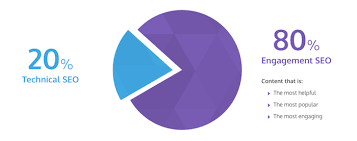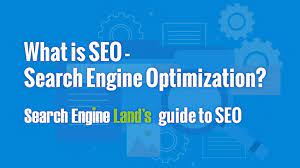SEO Meaning: Unlocking the Power of Search Engine Optimization
In today’s digital age, the term “SEO” is frequently thrown around in conversations about online marketing and website visibility. But what exactly does SEO mean, and why is it so important for businesses? Let’s delve into the world of search engine optimization and explore its meaning and significance.
SEO, or Search Engine Optimization, refers to the practice of optimizing a website to improve its visibility and ranking on search engine results pages (SERPs). In simpler terms, it involves making certain changes to your website design and content to make it more attractive to search engines like Google, Bing, or Yahoo.
When users search for specific keywords or phrases related to your business or industry, search engines use complex algorithms to determine which websites are most relevant and should appear at the top of the results. SEO aims to enhance your website’s chances of ranking higher in these organic (non-paid) search results.
One key aspect of SEO is keyword research. By identifying the words or phrases that potential customers are likely to use when searching for products or services similar to yours, you can strategically incorporate those keywords into your website content. This helps search engines understand the relevance of your site to a particular query.
However, SEO is not just about stuffing keywords into your content. It also involves optimizing various technical aspects of your website, such as ensuring fast loading times, mobile responsiveness, user-friendly navigation, and secure connections. These factors contribute to a positive user experience, which search engines value when determining rankings.
Another essential component of SEO is off-page optimization. This includes building high-quality backlinks from reputable websites that point back to yours. Backlinks act as endorsements from other sites and can significantly impact your website’s credibility and authority in the eyes of search engines.
Implementing effective SEO strategies requires continuous monitoring and analysis. Regularly reviewing metrics such as organic traffic, bounce rates, conversion rates, and keyword rankings helps you understand what is working and what needs improvement. This data-driven approach allows you to make informed decisions and refine your SEO tactics accordingly.
Now that we understand the meaning of SEO, let’s explore why it is crucial for businesses. In today’s highly competitive online landscape, a strong online presence is essential for success. By optimizing your website for search engines, you increase the visibility of your brand, attract more organic traffic, and reach a wider audience.
Improved visibility leads to increased website traffic, which can ultimately result in higher conversions and sales. When your website appears at the top of SERPs, users perceive it as more trustworthy and credible. This boost in reputation can significantly impact customer perception and influence their decision-making process.
Furthermore, investing in SEO can provide long-term benefits for your business. Unlike paid advertising methods, such as pay-per-click (PPC) campaigns, SEO efforts continue to generate organic traffic even after you stop actively optimizing your site. This makes it a cost-effective strategy with a high return on investment (ROI) over time.
In conclusion, SEO plays a vital role in enhancing online visibility and driving organic traffic to websites. By understanding the meaning of SEO and implementing effective optimization strategies, businesses can establish a strong digital presence, attract more customers, and ultimately achieve their goals in today’s competitive digital landscape.
If you’re ready to unlock the power of search engine optimization for your business or website, consider partnering with professionals who specialize in SEO services. With their expertise and guidance, you can navigate the ever-changing world of SEO and reap the benefits of improved visibility and increased online success.
8 Essential SEO Tips for Better Website Rankings and Performance
- Make sure you use relevant keywords throughout your content.
- Use meta tags to describe the content of your page and help search engines understand it better.
- Ensure that your website is mobile-friendly as more people are using mobile devices to access the internet.
- Create quality backlinks from other websites to boost your rankings in search engine results pages (SERPs).
- Optimise images by including alt text and descriptive file names so they can be easily indexed by search engines.
- Use heading tags (H1, H2, etc.) to structure the content on each page and make it easier for users to navigate through the information quickly and efficiently.
- Keep an eye on competitors’ activity in order to stay one step ahead of them in terms of SEO performance and visibility in SERPs rankings .
- Utilize Google Analytics or other tools available online for tracking website performance metrics such as page views, bounce rates, time spent on site, etc., which can help you identify areas where your SEO efforts need improvement
Make sure you use relevant keywords throughout your content.
SEO Tip: Harness the Power of Relevant Keywords in Your Content
When it comes to search engine optimization (SEO), one crucial aspect to focus on is the use of relevant keywords throughout your content. Keywords are the words or phrases that users type into search engines when looking for information, products, or services. By strategically incorporating these keywords into your content, you can improve your website’s visibility and attract more organic traffic. Let’s dive into why using relevant keywords is essential for effective SEO.
First and foremost, relevant keywords act as a bridge between what users are searching for and the content you provide. When search engines crawl your website, they analyze the presence and context of keywords to determine how well your content matches users’ queries. By using targeted keywords that align with your business or industry, you increase the chances of search engines recognizing your website as a valuable resource.
However, it’s important not to overuse or “stuff” keywords unnaturally into your content. Search engines have become smarter in detecting keyword manipulation and may penalize websites that engage in such practices. Instead, focus on incorporating keywords organically within your text while ensuring that it flows naturally and provides value to readers.
To identify relevant keywords for your content, conduct thorough keyword research. There are various tools available that can help you discover popular search terms related to your industry. Look for keywords with a decent search volume but also consider their competition level. Choosing highly competitive keywords might make it harder to rank against established websites, so striking a balance is crucial.
Once you have identified the most relevant and valuable keywords for your content, strategically place them in key areas such as headlines, subheadings, meta tags, image alt tags, and within the body of your text. However, remember that user experience should always be a priority. Avoid keyword stuffing or sacrificing readability just to include more keywords.
Using relevant keywords throughout your content not only helps search engines understand what your website is about, but it also enhances the user experience. When users find content that aligns with their search queries, they are more likely to stay on your site, engage with your content, and potentially convert into customers.
Furthermore, incorporating keywords in your content can also contribute to building a strong internal linking structure. By linking relevant pages within your website using keyword-rich anchor text, you provide search engines with additional signals about the importance and relevance of those pages. This can help improve your website’s overall visibility and ranking.
In conclusion, using relevant keywords throughout your content is a fundamental SEO practice that can significantly impact your website’s visibility and attract organic traffic. By conducting thorough keyword research and strategically incorporating these keywords into your content in a natural and valuable way, you increase the chances of search engines recognizing your website as a valuable resource for users. So, harness the power of relevant keywords and unlock the potential of effective SEO for your online presence.
Use meta tags to describe the content of your page and help search engines understand it better.
Unlock the Power of Meta Tags: Enhancing SEO Meaning
In the world of search engine optimization (SEO), meta tags play a crucial role in helping search engines understand and categorize the content of your web pages. By utilizing meta tags effectively, you can improve your website’s visibility and enhance its overall SEO performance.
Meta tags are snippets of HTML code that provide information about a webpage’s content. They don’t appear visibly on the page itself but are embedded within the page’s code. The two most commonly used meta tags are the meta title tag and the meta description tag.
The meta title tag is an HTML element that specifies the title of a webpage. It appears as the clickable headline in search engine results and is essential for both users and search engines. Crafting a concise, descriptive, and keyword-rich meta title tag can significantly impact your website’s click-through rate (CTR) and visibility on SERPs.
Similarly, the meta description tag provides a brief summary of what users can expect to find on your webpage. Although search engines don’t directly use it as a ranking factor, it plays a crucial role in enticing users to click through to your site. A well-crafted meta description that accurately reflects your page’s content can improve CTRs and attract relevant traffic.
When creating meta tags, it’s important to include relevant keywords that reflect the content of your page. Conducting thorough keyword research will help you identify which terms potential visitors are using when searching for information related to your industry or business. By incorporating these keywords into your meta tags, you increase the likelihood of search engines associating your page with relevant queries.
While optimizing meta tags is important for SEO purposes, it’s equally important to ensure they accurately represent your webpage’s content. Misleading or irrelevant meta tags may result in high bounce rates as users quickly realize that your page doesn’t meet their expectations. This could negatively impact both user experience and search engine rankings.
Additionally, each page on your website should have unique meta tags that accurately reflect its specific content. This helps search engines differentiate between different pages and understand their individual relevance to specific search queries. Avoid duplicating meta tags across multiple pages, as this can lead to confusion and potentially dilute the overall SEO performance of your website.
Regularly reviewing and updating your meta tags is essential for maintaining optimal SEO performance. As search engine algorithms evolve, it’s important to adapt your meta tags to align with best practices and industry trends. Monitor the performance of your meta tags through analytics tools, such as Google Analytics, to gain insights into user behavior and make data-driven improvements.
In conclusion, utilizing meta tags effectively can greatly enhance your website’s SEO performance. By crafting compelling and accurate meta title and description tags that incorporate relevant keywords, you can improve visibility on search engine results pages and attract targeted traffic to your site. Remember to regularly review and update your meta tags to stay in line with evolving SEO practices.
Unlock the power of meta tags today and give your website a competitive edge in the digital landscape.
Ensure that your website is mobile-friendly as more people are using mobile devices to access the internet.
In today’s digital era, the rise of mobile devices has revolutionized the way people access information and browse the internet. With an increasing number of users relying on smartphones and tablets for their online activities, it is crucial for businesses to ensure that their websites are mobile-friendly. This aspect of search engine optimization (SEO) holds immense significance in reaching and engaging with a wider audience.
Mobile-friendliness refers to the responsiveness and adaptability of a website when accessed on various mobile devices. A mobile-friendly website is designed to provide users with an optimal browsing experience, regardless of the screen size or device they are using. It involves implementing responsive design techniques, which automatically adjust the layout, content, and functionality of a website to fit different screens.
Why is mobile-friendliness so important for SEO? Firstly, search engines like Google prioritize mobile-friendly websites in their rankings. They understand that user experience is paramount, and websites that cater well to mobile users are more likely to provide a positive browsing experience. As a result, these sites tend to rank higher in search engine results pages (SERPs).
Moreover, with the exponential growth in mobile internet usage, failing to optimize your website for mobile devices can lead to missed opportunities. If visitors encounter difficulties navigating your site or if it loads slowly on their smartphones or tablets, they are likely to leave and seek alternatives elsewhere. This high bounce rate can negatively impact your website’s rankings and conversions.
By ensuring your website is mobile-friendly, you not only improve its visibility but also enhance user engagement and satisfaction. A seamless browsing experience on mobile devices encourages visitors to stay longer on your site, explore its content, and potentially convert into customers or subscribers. Positive user experiences often translate into improved metrics such as lower bounce rates and higher time spent on site – factors that search engines consider when assessing website quality.
To make your website more mobile-friendly, consider implementing responsive design principles during its development or redesign process. This approach allows your website to adapt to different screen sizes, ensuring that all elements are easily accessible and readable on mobile devices. Additionally, optimize your site’s loading speed by compressing images, minimizing code, and utilizing caching techniques.
Regularly testing your website’s mobile-friendliness is also essential. Tools like Google’s Mobile-Friendly Test can assess your site’s performance on mobile devices and provide recommendations for improvement. By staying proactive and responsive to evolving mobile trends, you can maintain a competitive edge in the digital landscape.
In conclusion, as more people rely on mobile devices for internet access, ensuring that your website is mobile-friendly is paramount for SEO success. By optimizing your site’s design and functionality for smartphones and tablets, you enhance user experience, improve search engine rankings, and maximize opportunities for engagement and conversions. Embrace the mobile revolution and make your website accessible to all users, regardless of the device they choose to browse the web.
Create quality backlinks from other websites to boost your rankings in search engine results pages (SERPs).
Boost Your Website’s Ranking with Quality Backlinks
When it comes to improving your website’s visibility and ranking on search engine results pages (SERPs), one effective strategy is to create quality backlinks from other websites. Backlinks act as endorsements for your site, signaling to search engines that your content is valuable and trustworthy. In this article, we’ll explore how backlinks can boost your rankings in SERPs and why they are an essential aspect of SEO.
Backlinks are links that point from one website to another. They serve as a vote of confidence, indicating that other websites find your content useful and relevant. Search engines like Google consider these backlinks as a measure of your website’s authority and credibility, which can positively impact your rankings.
However, not all backlinks are created equal. Quality backlinks from authoritative and reputable websites carry more weight than those from low-quality or spammy sites. Aim for backlinks from websites that have a strong online presence, high domain authority, and share similar or relevant content to yours.
When search engines crawl the web, they analyze the quantity and quality of the backlinks pointing to your site. The more high-quality backlinks you have, the higher the likelihood of improving your rankings in SERPs.
Creating quality backlinks requires a proactive approach. Here are some strategies to consider:
- Guest Blogging: Reach out to authoritative blogs or websites within your industry and offer to write guest posts. In return for providing valuable content, you can include a link back to your website within the author bio or body of the article.
- Content Promotion: Create compelling and shareable content that naturally attracts links from other websites. This could be in the form of informative articles, infographics, videos, or research studies that provide unique insights or solutions.
- Influencer Outreach: Collaborate with influencers or industry experts who have a strong online presence. By engaging with them through interviews, collaborations, or endorsements, you can generate backlinks from their websites or social media profiles.
- Broken Link Building: Identify broken links on other websites within your niche and reach out to the site owners. Offer them a replacement link to your relevant content as a solution. This not only helps them fix broken links but also provides you with an opportunity to gain a valuable backlink.
Remember, the key to building quality backlinks is to focus on relevance and value. Search engines prioritize natural and organic link-building practices over manipulative tactics that violate their guidelines. Avoid purchasing links or participating in link schemes, as this can result in penalties that harm your website’s rankings.
In conclusion, creating quality backlinks from reputable websites is an effective strategy to boost your rankings in SERPs. By earning endorsements from other sites through valuable content and genuine relationships, you enhance your website’s authority and credibility in the eyes of search engines. Invest time and effort into building quality backlinks as part of your SEO strategy, and watch as your website climbs higher in search engine rankings, attracting more organic traffic and potential customers along the way.
Optimise images by including alt text and descriptive file names so they can be easily indexed by search engines.
Boost Your SEO: Optimise Images for Better Search Engine Indexing
When it comes to search engine optimization (SEO), many website owners focus primarily on optimizing their text content. However, they often overlook a crucial aspect of SEO: image optimization. By taking the time to optimise your images, you can improve your website’s visibility and increase your chances of ranking higher on search engine results pages (SERPs).
One essential tip for image optimization is to include alt text and descriptive file names. Alt text, short for alternative text, is a brief description that you provide for an image. It serves as a textual representation of the image and helps search engines understand what the image is about.
When search engines crawl your website, they rely on various signals to determine the relevance of your content. Alt text provides them with valuable information that they can use to index and rank your images appropriately. By using descriptive alt text that accurately reflects the content of your images, you enhance their visibility in search results.
Additionally, using descriptive file names for your images further aids search engine indexing. Instead of generic names like “IMG_1234.jpg” or “image1.png,” opt for more specific filenames that describe the subject matter of the image. For example, if you have an image of a red rose, a suitable file name could be “red-rose.jpg.” This way, search engines can better understand what the image represents.
By optimising your images with alt text and descriptive file names, you make it easier for search engines to index and categorise them correctly. This improves the overall visibility and accessibility of your website’s visual content.
Moreover, optimizing images can also have a positive impact on user experience. When users visit your site, they may have slow internet connections or encounter technical difficulties that prevent images from loading properly. In such cases, alt text provides them with valuable information about what the missing image represents.
Remember that while alt text and descriptive file names are crucial for SEO, it’s essential to strike a balance. Avoid keyword stuffing or using irrelevant descriptions that do not accurately reflect the image content. Focus on providing concise and accurate descriptions that enhance both search engine indexing and user experience.
In conclusion, optimising images by including alt text and descriptive file names is a simple yet effective tip for improving your website’s SEO. By implementing this practice, you can enhance search engine indexing, increase visibility in image searches, and provide a better user experience. Take the time to optimise your images, and you’ll reap the rewards of improved search engine rankings and increased organic traffic to your site.
Use heading tags (H1, H2, etc.) to structure the content on each page and make it easier for users to navigate through the information quickly and efficiently.
Enhance User Experience and SEO with Heading Tags
When it comes to optimizing your website for search engines, using heading tags (H1, H2, etc.) is a simple yet effective technique that can make a significant impact. These tags not only help structure your content but also improve user experience by making it easier for visitors to navigate through the information quickly and efficiently.
Heading tags act as signposts within your webpage, highlighting the hierarchy and organization of your content. The H1 tag represents the main heading of the page, followed by subheadings denoted by H2, H3, and so on. Search engines use these tags to understand the context of your content and determine its relevance to specific search queries.
By utilizing heading tags strategically, you can improve both readability and SEO. Here’s how:
- Organize Your Content: Heading tags provide a logical structure to your webpage. They break down your content into sections and sub-sections, allowing readers to scan through the page easily. This organization helps visitors find relevant information quickly without feeling overwhelmed.
- Keyword Placement: Incorporating relevant keywords in your headings can boost your SEO efforts. Search engines consider headings as important indicators of content relevance. By including targeted keywords in heading tags, you signal to search engines that those keywords are significant in relation to the rest of the content on the page.
- Improved Readability: Clear headings help users quickly grasp the main points covered in each section of your webpage. When readers can easily skim through headings and subheadings, they can decide which parts are most relevant to their needs or interests. This improves overall user experience and encourages them to stay longer on your site.
- Featured Snippets: Heading tags can also enhance the chances of appearing in featured snippets—a prominent position at the top of search results that displays concise information related to a specific query. By structuring your content with well-optimized headings, you increase the likelihood of your content being featured in these snippets, which can drive more organic traffic to your site.
Remember to use heading tags appropriately and avoid overusing them. Each page should have only one H1 tag, representing the main heading, followed by subheadings using H2, H3, etc. This ensures clarity and consistency in your content structure.
In conclusion, incorporating heading tags into your website’s content is a simple yet effective SEO practice that benefits both search engines and users. By organizing your content hierarchically and incorporating relevant keywords, you improve the readability of your pages while signaling to search engines the importance of specific topics. This can lead to better search rankings, increased organic traffic, and an overall improved user experience on your website.
Staying Ahead of the Game: Monitoring Competitors for SEO Success
In the ever-evolving world of search engine optimization (SEO), keeping a watchful eye on your competitors is crucial to maintaining a competitive edge. By monitoring their activities and strategies, you can stay one step ahead in terms of SEO performance and visibility in search engine results page (SERP) rankings.
Why is it important to keep an eye on your competitors? Well, in the digital realm, businesses are constantly vying for the attention of online users. By understanding what your competitors are doing in terms of SEO, you gain valuable insights into their tactics and can identify areas where you can outperform them.
One way to monitor your competitors is by conducting regular keyword research. Identify the keywords they are targeting and compare them with your own strategy. Are there any gaps or untapped opportunities that you can capitalize on? By staying updated on keyword trends and adjusting your content accordingly, you can improve your chances of ranking higher than your rivals.
Additionally, pay attention to their website structure and user experience. Is their site easy to navigate? Are they utilizing engaging visuals or interactive elements? Analyzing these aspects allows you to identify potential improvements for your own website. By providing a seamless user experience, you increase the likelihood of visitors staying longer on your site and engaging with your content.
Backlinks are another crucial element to monitor. Keep track of the websites linking back to your competitors’ sites. Are there any high-authority domains that they have successfully acquired backlinks from? This information helps you identify potential link-building opportunities for yourself. Building relationships with reputable websites through guest posting or collaboration can boost both your credibility and search engine rankings.
Social media presence is also worth considering when monitoring competitors. Take note of which platforms they are active on and how they engage with their audience. Are they leveraging social media effectively to drive traffic to their website? By observing their strategies, you can refine your own social media approach and potentially gain an edge in terms of visibility and audience engagement.
Regularly reviewing your competitors’ SEO performance allows you to adapt and refine your own strategies accordingly. By staying one step ahead, you can identify emerging trends, adjust your content strategy, and optimize your website to improve its visibility in SERP rankings.
However, it’s important to note that monitoring competitors does not mean blindly copying their every move. Instead, use the insights gained from competitor analysis as inspiration to innovate and differentiate yourself. Identify what sets you apart from the competition and focus on highlighting those unique qualities.
In conclusion, keeping a close eye on your competitors’ activities is an essential aspect of successful SEO. By monitoring their strategies and performance, you can identify opportunities for improvement and stay ahead of the game. Remember to leverage these insights to innovate rather than imitate, ultimately propelling your business towards increased visibility and success in the digital landscape.
Utilize Google Analytics or other tools available online for tracking website performance metrics such as page views, bounce rates, time spent on site, etc., which can help you identify areas where your SEO efforts need improvement
Utilize Google Analytics or other Online Tools to Enhance Your SEO Efforts
In the world of search engine optimization (SEO), tracking and analyzing website performance metrics is crucial for understanding the effectiveness of your SEO strategies. Thankfully, tools like Google Analytics provide valuable insights into various metrics that can help you identify areas where your SEO efforts need improvement.
One of the most powerful tools available for tracking website performance, Google Analytics offers a wealth of information about your site’s visitors and their behavior. By integrating this tool into your website, you can gain access to valuable data such as page views, bounce rates, time spent on site, and much more.
Page views indicate how many times a specific page on your website has been viewed by visitors. Monitoring this metric allows you to identify which pages are attracting the most attention and which may need further optimization. By focusing on popular pages, you can capitalize on their success and replicate strategies that have proven effective.
Bounce rates refer to the percentage of visitors who leave your website after viewing only one page. High bounce rates can indicate that visitors are not finding what they’re looking for or that your content is not engaging enough. By analyzing bounce rates for different pages, you can pinpoint areas where improvements are needed, such as enhancing content relevance or improving user experience.
Time spent on site provides insights into how engaged visitors are with your content. If users spend a significant amount of time exploring multiple pages on your site, it indicates that they find value in what you offer. Conversely, if visitors quickly exit after viewing just one page, it may be an indication that improvements are required to keep them engaged.
By regularly monitoring these metrics through tools like Google Analytics, you gain a deeper understanding of how users interact with your website and which aspects require attention. Armed with this knowledge, you can make data-driven decisions to refine your SEO strategies and improve overall website performance.
Additionally, Google Analytics offers features such as audience demographics, referral sources, and conversion tracking, which provide further insights into your website’s performance. Understanding your audience’s characteristics and where they come from can help you tailor your content and marketing efforts to better reach and engage your target audience.
In conclusion, utilizing tools like Google Analytics or other online tracking tools is essential for optimizing your SEO efforts. By analyzing metrics such as page views, bounce rates, time spent on site, and more, you can identify areas that need improvement and make informed decisions to enhance your website’s performance. Stay proactive in monitoring these metrics regularly to ensure that your SEO strategies are effective in driving traffic and achieving your online goals.







